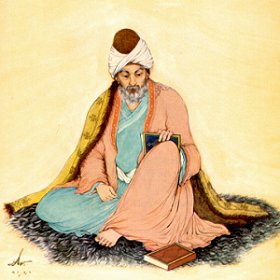From the beginning of my life
I have been looking for your face
but today I have seen it
Today I have seen
the charm, the beauty,
the unfathomable grace
of the face
that I was looking for
Today I have found you
and those who laughed
and scorned me yesterday
are sorry that they were not looking
as I did
I am bewildered by the magnificence
of your beauty
and wish to see you
with a hundred eyes
My heart has burned with passion
and has searched forever
for this wondrous beauty
that I now behold
I am ashamed
to call this love human
and afraid of God
to call it divine
Your fragrant breath
like the morning breeze
has come to the stillness of the garden
You have breathed new life into me
I have become your sunshine
and also your shadow
My soul is screaming in ecstasy
Every fiber of my being
is in love with you
Your effulgence
has lit a fire in my heart
and you have made radiant
for me
the earth and sky
My arrow of love
has arrived at the target
I am in the house of mercy
and my heart
is a place of prayer
Published:
None
Length:
Regular
Literary Movements:
Sufism
Anthology Years:
2023
Themes:
Faith & Hope
Love & Relationships
Literary Devices:
Alliteration
the repetition of the same letter or sound at the beginning of words appearing in succession
Asyndeton
the absence of a conjunction (for, and, nor, but, or, yet, so…) between phrases and within a sentence
Enjambment
a line break interrupting the middle of a phrase which continues on to the next line
Metaphor
a comparison between two unrelated things through a shared characteristic
Sensory Detail
words used to invoke the five senses (vision, hearing, taste, touch, smell)

